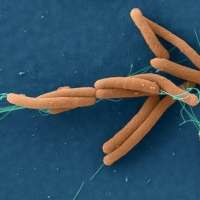Credit: Tingting Liao and Aleksandra Debowski
Scientists at The University of Western Australia and Perth-based biotech Ondek Pty Ltd have revealed new insights into the function of an important bacterial protein in Helicobacter pylori, the bacterium that causes stomach ulcers.
H. pylori, discovered by UWA Professor Barry Marshall and Emeritus Professor Robin Warren, infects the human stomach and causes ulcers. Professor Marshall and Dr Warren were awarded the 2005 Nobel Prize for Medicine and Physiology for their discovery.
The latest UWA-led research, published in PLOS Pathogens reveals that H. pylori needs a protein known as urease to sustain lifelong infection. Urease is made in large quantities by H. pylori and it is known that the protein is very important when the bacterium first enters the acidic stomach.
What was not known was whether the protein was needed for the bacterium to survive in the less harsh parts of the stomach, where it lives during lifelong infections and can start to damage the stomach and cause ulcers.
Lead author on the study Dr Aleksandra Debowski said the research demonstrated for the first time that H. pylori needed the protein for lifelong infection but what was more surprising was that the bacterium would give up production of other important proteins to keep urease production. "This result means that the protein is a very good target for designing new types of therapeutics to treat the infection," Dr Debowski said.
"Even though it has been hypothesised that this protein is needed by H. pylori for lifelong infection it has not been proven experimentally, until now."
Professor Marshall has invented two important clinical tests for diagnosing patientswith H. pylori infection, both of which are based on detecting the activity of the H. pylori urease protein.
"Even though we have studied this bacterium for more than 25 years, as new technologies become available, we discover that there are still many lessons to be learned from H. pylori," Professor Marshall said.
"By answering this one simple question, we have opened the door into new fields of research that promise to yield many more discoveries," Dr Debowski said.
More information: Aleksandra W. Debowski et al. Helicobacter pylori gene silencing in vivo demonstrates urease is essential for chronic infection, PLOS Pathogens (2017). DOI: 10.1371/journal.ppat.1006464
Journal information: PLoS Pathogens
Provided by University of Western Australia






















